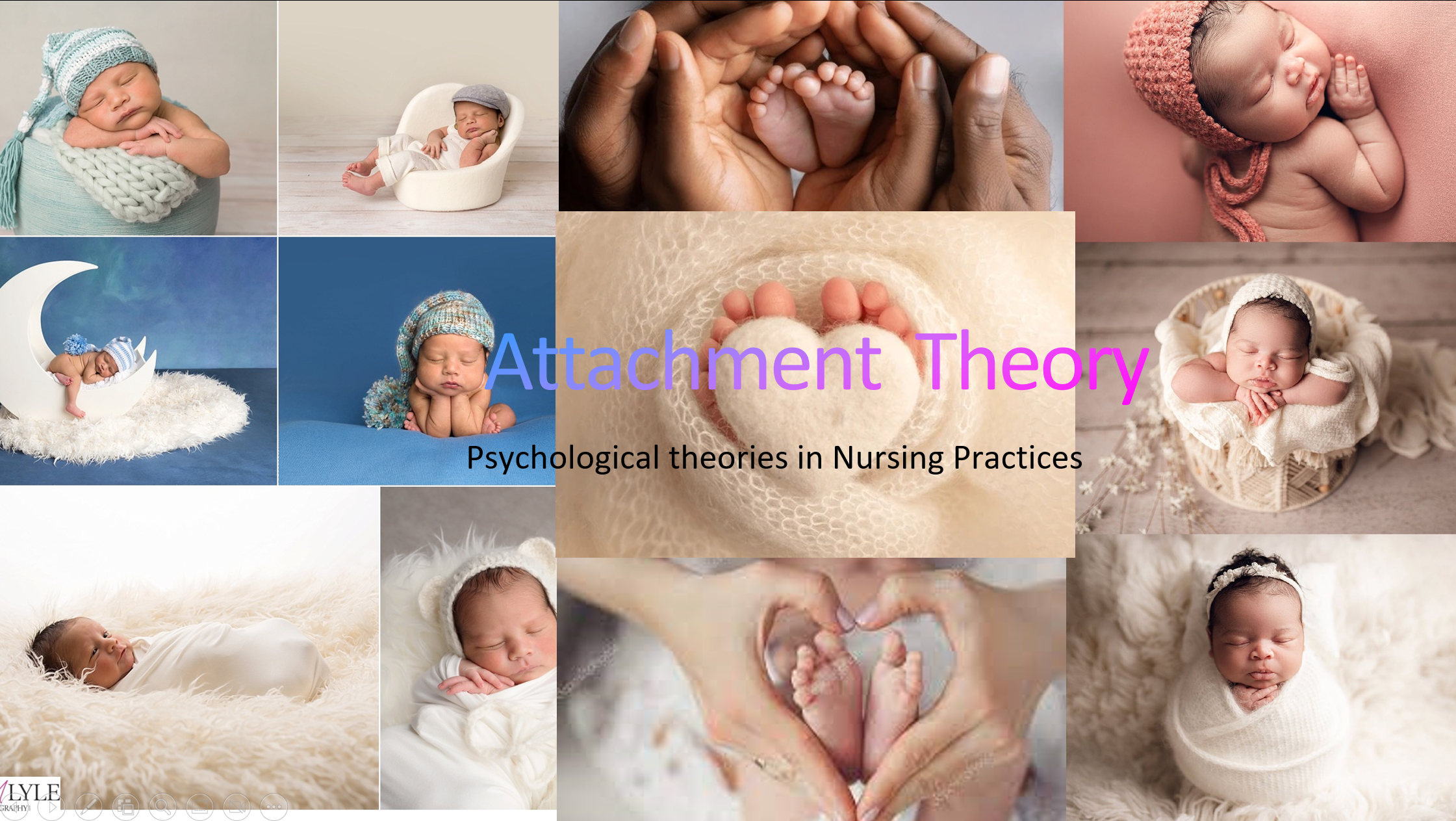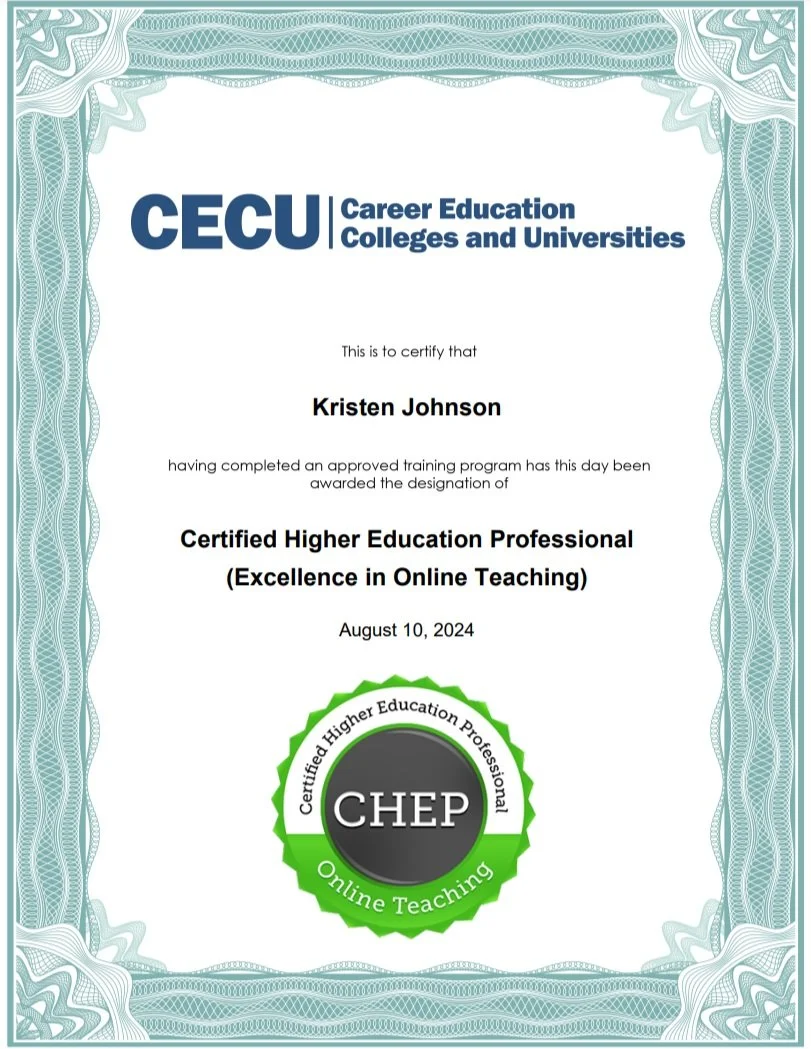
Teaching Portfolio
Teaching Philosophy
As a first-generation college graduate, I understand the transformative power of education. My teaching philosophy is rooted in the belief that education should not only inform but transform. My primary goals as an educator are to cultivate critical thinking, inspire curiosity, and nurture a mindset of lifelong learning. I aim to encourage students to think beyond conventional boundaries and find creative solutions to complex problems, preparing them to be adaptive thinkers in an ever-changing world.
Beliefs About Teaching and Learning:
I believe that every student learns differently, and creativity is essential in reaching these diverse learners. My approach is learner-centered, simplifying complex concepts into meaningful pieces that the brain can easily connect with. Drawing from a constructivist perspective, I see learning as an active, engaging process, where multimedia designs, digital learning tools, interactive experiences, and collaborative learning play a pivotal role.
Methods and Strategies:
In my psychology courses, I encourage deep philosophical discussions, inviting students to share their thoughts, question ideas, and reflect on how they would respond in various situations. This sparks meaningful dialogue and builds an inclusive, thought-provoking environment where each student’s voice is valued. In my classroom, technology is a tool for connection and exploration. I integrate multimedia designs, interactive experiences, and collaborative learning to create a vibrant and engaging environment.
Student Engagement:
One thing I love in teaching is that "lightbulb moment" of learning—the instant when a student makes a connection and everything clicks. These moments of clarity are more than just understanding the material; they represent a more purposeful integration of the subject matter. My goal is to create the conditions for as many of these moments as possible, helping students realize their potential and apply their knowledge in innovative ways. I encourage open dialogue, empowering students to take ownership of their learning. By encouraging thoughtful engagement and critical questioning, they become active participants in their educational journey.
Assessment and Evaluation:
Assessment is a blend of formative and summative approaches, with self-reflection integrated throughout the learning process. This allows students to track their progress, reflect on their growth, and take responsibility for their learning outcomes.
Professional Growth:
As a lifelong learner myself, I am committed to continually improving my teaching methods. I seek out opportunities for professional growth and actively create new content to keep my courses fresh, engaging, and aligned with the latest developments in education. Ultimately, I aim to inspire in my students the same sense of curiosity, passion, and critical thinking that has guided me throughout my academic and professional journey.
Impact on Students:
The impact of my teaching is reflected in student feedback, with reviews highlighting the inclusive learning environment and the purposeful discussions we share. My goal is for students to leave my classroom not only with knowledge but with the skills and mindset to apply that knowledge in innovative ways throughout their lives.
Instructional Visual Aid Designed by Professor Kristen- James Marcia's Adolescent Identity Development
Instructional Visual Aid Designed by Professor Kristen- Positive and Negative Reinforcement
Courses Taught
-
This course introduces the learner to diverse concepts in psychology and the many psychological processes that influence humans throughout the life span. Topics discussed include the following: foundations; development; sensation, perception, and states of consciousness; learning, memory, and thinking, motivation and emotion; personality, abnormal psychology, and psychotherapy; social behavior; and statistical reasoning.
-
This course provides a fundamental overview of developmental psychology to provide the student with a knowledge base for how psychology influences the client and their health. This course relates the Nursing Process to developmental psychological influences throughout the life span and examines psychological theories and perspectives. This course examines how individuals develop throughout their lifetime, from infancy to old age and includes both physical and cognitive development. Students will use the learning resource center/library to choose a developmental theorist and write a two-page paper concerning the relevancy of the theoretical perspective on the children of the twenty-first century. This introductory course will give the practical nursing student the knowledge base to understand how individuals develop throughout their life and how that development impacts health status.
-
This course studies cognitive, physical, social and emotional development of individuals and families throughout the lifespan. The course explores the seven major periods of life-span development (infancy, early childhood, middle childhood, adolescence, early adulthood, middle adulthood, and late adulthood) and the cultural, social and religious influences in each phase of development. The course also provides an overview of the significant biosocial, cognitive, and psychological events for each major period of development, as well as, how they impact human development. Students will be introduced to a variety of developmental theories, including Freud, Erickson, Piaget, Maslow, Kolhberg, Havighurst, and others.
-
This course introduces the concepts of pharmacology. The focus is on the basic principles of biophysics, biochemistry and physiology related to drug action and interaction, distribution, metabolism and toxicity. The course will cover pharmacological agents used in the treatment of illness and the promotion, maintenance and restoration of wellness. Special consideration in the course will be given to drug administration, monitoring of physiological, psychological, and sociological effects of agents, and interactions and adverse effects of each drug classification.
-
This course is a continuation of Human Body in Health and Disease I. It covers the study of the structure and function and relationship of disease on the nervous, respiratory, digestive system and endocrine systems, as well as development, metabolism, electrolytes and acid base balance. In addition, the course explores the human body and disease with respect to growth and development, male and female reproductive systems and heredity disease.
-
A weekly workshop designed to empower students through test anxiety stress reduction techniques, time management skills, and test-taking strategies to prepare nursing students for the NCLEX.
Course Evaluations
-
“Kristen was amazing again! This was my second time having her as an instructor, and she didn't disappoint. She's super knowledgeable, helpful and makes learning fun and engaging. Thanks Kristen for another great class!”
— Student Evaluation, Winter 2024
-
“She's an awesome teacher and easy to communicate with. I wish I could have her teach all of my classes”
— Student Evaluation, Winter 2024
-
“It is always a pleasure having Kristen as in instructor. Kristen is very patient and informative. Everything was perfect”
— Student Evaluation, Winter 2024
-
“She is lovely and understanding.”
— Student Evaluation, Winter 2024
-
“You’re an awesome teacher”
— Student Evaluation, Winter 2024
-
"Thank you for all the time and effort you put into teaching us. thanks for your encouragement and guidance, I feel much more confident in my nursing skills."
— Student Evaluation, Fall 2024
-
"She was a great teacher, she was down to earth and wanted nothing but the best for us to succeed. And I wish she was teaching other classes."
— Student Evaluation, Fall 2024
-
"Ms. Kristen Johnson is an amazing teacher. Not only does the way she teaches make you as a student understand but also she is very patient and cares about her students. The videos she posted were very informative. I enjoyed her class!"
— Student Evaluation, Fall 2024
-
"It was a pleasure, and Thank you for being informative and patient with all of us. Keep doing great things."
— Student Evaluation, Fall 2024
-
"Kristen is great and a wonderful teacher!!!"
— Student Evaluation, Fall 2024
-
"Kristen is a great instructor. She was perfect."
— Student Evaluation, Fall 2024
-
"ALL OUT GREAT TEACHER!!!"
— Student Evaluation, Fall 2024
-
"Great class"
— Student Evaluation, Fall 2024
-
"Kristen was great" — Student Evaluation, Fall 2024
-
"I love this course. Kristen was fun and very detailed. I enjoyed her class and she enjoyed us she made the classes very fun while learning"
— Student Evaluation, Fall 2024
Faculty Evaluations
Faculty Evaluations
“I really enjoyed your psychology class, it was very interactive, interesting, and you have a great charm and personality that is inviting to students. This was one of the best classes I have sat in on in a while....WELL DONE!!!!”
—Martin Dineen MSN, RN, Faculty Evaluator
As both a virtual and in-person instructor, I create an energetic, real-time learning environment where students are constantly interacting and exploring ideas together. Live discussions are at the heart of this, giving students the chance to dive deep into course topics while exchanging insights and offering peer feedback in the moment. I mix things up with multimedia assignments, such as virtual presentations and digital/ hands-on storytelling, which allows students to showcase their creativity and apply concepts in meaningful ways. Reflective journaling encourages them to pause, think critically, and connect their learning to personal experiences. To keep things fun and engaging, I use virtual polls and games during live sessions, sparking excitement and encouraging active participation. These methods help build a vibrant, collaborative classroom where students feel motivated and connected.
Real-Time Engagement and Interactive Learning Assignments
Student Work Samples
Continuing Professional Development
As an educator, my love of learning fuels everything I do in the classroom. I am driven by a deep curiosity about how we think, learn, and grow, which inspires me to keep exploring new ideas and approaches. Whether diving into recent research, attending workshops, or simply experimenting with new ways of engaging students, I am constantly seeking opportunities to learn and develop. This ongoing process of growth helps me stay connected to the fields of nursing and psychology, and keeps my teaching fresh and dynamic. I aim to pass on this same sense of curiosity to my students, encouraging them to question, explore, and take an active role in their own learning.
As a lifelong learner, I am always exploring advanced teaching certifications to deepen my understanding of pedagogy and enhance the learning experience for my students. This pursuit reflects my belief that teaching is a continually evolving practice, one that requires ongoing reflection and refinement.








